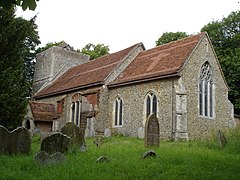Flowton
| Flowton | |
|---|---|
 Church of St Mary |
|
| Flowton shown within Suffolk | |
| Population | 117 (2011 Census) |
| OS grid reference | TM082468 |
| Civil parish |
|
| District | |
| Shire county | |
| Region | |
| Country | England |
| Sovereign state | United Kingdom |
| Post town | Ipswich |
| Postcode district | IP8 |
| Dialling code | 01473 |
| Police | Suffolk |
| Fire | Suffolk |
| Ambulance | East of England |
| EU Parliament | East of England |
| UK Parliament |
|
Flowton is a village and civil parish in the Mid Suffolk district of Suffolk in eastern England, with a population of 117 people. The name 'Flowton' originally derives from the word 'Flocctun', meaning a flock of sheep or a sheep farm. The parish is located around six miles north west of Ipswich, which is the county town of Suffolk. Flowton contains the hamlet of Flowton Brook, and consists of rural farmland accompanied by scattered farm houses and a few newer builds situated nearby the parish church of 'St Mary's'. In the 1870s, Flowton was described as:
Flowton's parish church, 'St Mary's' was built in the 13th century and has been a Christian place of worship for around 700 years. The church holds many fundraising events, gaining goodwill and financial support from the village, as well as from the wider population. St Mary's Church is a Grade I listed building, made of flint rubble walling with freestone dressings and buttressing. It consists of a nave, chance, south porch and west tower. Evidence from medieval mass can be seen east of the porch on buttresses where there are mass dials carved into the stone. These dials would have previously shown the villages the time at which the service would be held. Changes to the church have been made over the centuries with its most recent known addition being around the late 18th century when a vestry was added to the north of the chancel. It is thought that this vestry was used as a school room for the village children.
Flowton Priory was in the village of Flowton for 400 years, after being built in 1525. In 1928 it was moved brick by brick to Harpenden, Hertfordshire, after its owner, a wealthy family member, ordered it to be deconstructed and reassembled. In 1994, it was bought by racing driver, David Pinkney. "The great thing is that when it was moved, every beam, brick and tile was checked and made good. And it was put on solid foundations with a damp-proof course." It is currently listed as being a Grade II Tudor Mansion.
There is an irregular change in both Flowton's total population and the number of houses between 1831 and 1861. The population graph shows that there is an increase in the number of houses between 1831 and 1851, with a decrease in population. This is then followed by a further decline in population, along with a decrease in the number of houses in 1921. Flowton's population grows rapidly 1811 and 1831, it then remains fairly steady until 1851. Therefore, indicating that Flowton's community was developing, as there was also an increase in the number of houses. Both population and the number of houses declined in the early 1900s, with the population not considerably rising again until 2001.
...
Wikipedia

